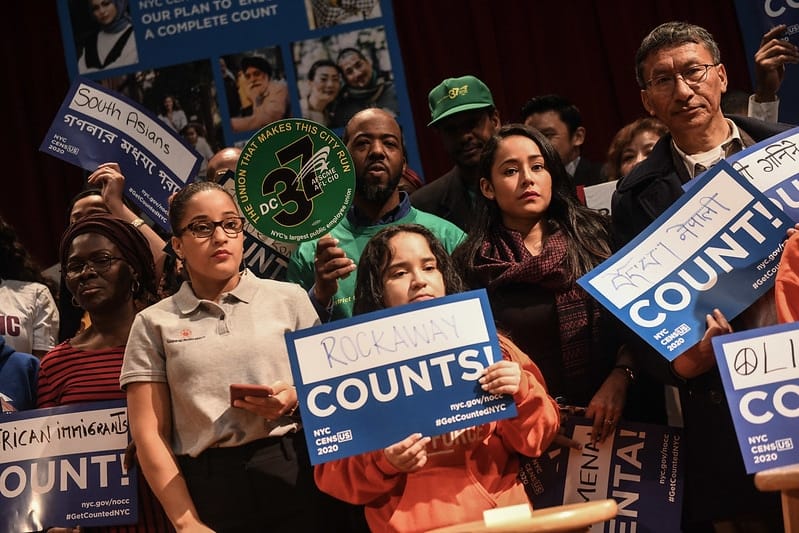NYC’s Basement Apartment Crackdown Clashes with Census Outreach Efforts



By Trone Dowd, for THE CITY.
Originally posted on February 4, by THE CITY.
With the 2020 Census stakes high for the city, Mayor Bill de Blasio and Council Speaker Corey Johnson have awarded $16 million grants to scores of nonprofits to help ensure every New Yorker is counted.
Meanwhile, the city’s Department of Buildings, is cracking down on unregistered apartments carved out of basements and other spaces — giving an unknown number of New Yorkers, many of them immigrants, reason to hide from view.
“You don’t know what giving away that kind of information will do,” said Mario, a 43-year-old Ecuadorian immigrant who lives in a basement apartment in Jamaica, Queens. “Now they got your name and the area of where you may live. No. I can’t risk my life, where I lay my head and how I support my family.”
In 2019, the Department of Buildings issued 5,151 violations to property owners for illegal apartment conversions, city records show, compared to 4,665 the year before.
Most of those violations hit buildings in Brooklyn and Queens, and some demand immediate shutdown of the illegal apartment in the face of a $1,000-a-day fine.
The department has issued 209 violations so far this year.
“Lots and lots of people have basement renters,” said Michelle Neugebauer, executive director of Cypress Hills Local Development Corp., a Brooklyn group working with the city in a pilot program that aims to bring some basement apartments up to legal code.
“They have been hit by so many inspectors and enforcers from the Department of Buildings over the years, that they’re very leery to admit that they have a current renter,” she added.
Trump Citizenship Question Echoes
Many of those renters are immigrants, already wary of giving information to the government, especially if they’re undocumented.
The Trump administration’s failed push to add a citizenship question to the survey only compounds fears — even though federal law prohibits the government from using census information for any purpose other than counting the population and creating statistics.
Javier, a 30-year-old Mexican immigrant living in a basement apartment in Ridgewood, Queens, said he wouldn’t take part in the census.
“They don’t need to know where I am or why I’m here,” he said. “I don’t need any trouble with the government.”

City Census officials acknowledged that DOB enforcement could have an impact on Census turnout. They are planning to address the basement apartment issue directly, though he couldn’t offer any immediate details.
“It is precisely to reach historically undercounted and other hard-to-reach populations, including New Yorkers living in all types of housing arrangements, that NYC Census 2020 has invested $16 million in local organizing efforts,” said Amit Bagga, deputy director of NYC Census 2020.
Renting out a basement without a sprinkler system, ventilation, lighting and at least two means of exit is illegal. These spaces are a liability for landlords and potentially hazardous for the inhabitants who agree to live there — but many say they have no other affordable options.
There are as many as 114,000 New Yorkers living in basement apartments, the Pratt Center for Community Development estimates.
‘Key to NYC’s Future’
Getting every one of them counted is a priority for the city and state. The results of the Census will determine for the next decade how much money New York will get from the federal government to help fund services, as well as the shape and number of political districts in Washington and Albany.
New York’s Department of City Planning has been on a mission the last four years to canvass every address in the five boroughs. In all, they added 122,000 residential addresses that were not already in the system and over 59,000 address corrections to the U.S. Census Bureau.
“DCP’s demographers know to look for harder to find addresses, such as basement apartments,” said City Planning spokesperson Melissa Grace.
Ian Hull, the U.S. Census Bureau New York deputy regional director, said the online option for the census will be of significant help in getting hidden New Yorkers counted — allowing them to register online even if a sign-in code doesn’t arrive in the mail.
“We then match your address, we then process whatever you entered and link it to the correct internal ID and you can self-respond,” said Hull, adding that the Census Bureau will promote this option at houses of worship, libraries, schools and community centers.
If a household does not respond online, a Census worker will come to their door.
“No New Yorker should worry that answering Census questions honestly could threaten their living situation,” said Andrew Rudansky, a Buildings Department spokesperson. “An accurate Census count is key to New York City’s future.
“We want to be clear: the U.S. Census Bureau is prohibited by law from disclosing any information to any government agency, including DOB, and DOB does not use Census data to inform our enforcement actions.”
Rudansky added that residents who are removed from their basement dwelling are relocated by the American Red Cross, and, if eligible, offered housing by the city.
For Mario in Jamaica, that isn’t enough to bring him out of the shadows.
“Why would I want to be relocated?” he asked. “I have a stable place right now. I get to work from here easily right now. I don’t want to be placed somewhere I have no familiarity with. It just doesn’t work like that.”
This story was originally published by THE CITY, an independent, nonprofit news organization dedicated to hard-hitting reporting that serves the people of New York.




